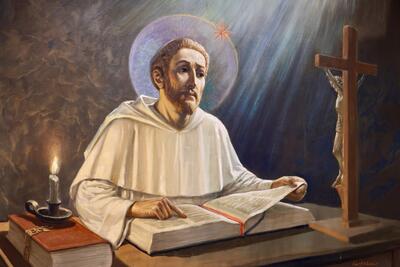O Lumen Ecclesiae
Is creation a blessing or a curse?
Hopefully, your gut reaction is an immediate, impulsive affirmation of existence. What a ridiculous notion to call creation a curse! How many times have we heard from Genesis, “God looked at everything he had made, and found it very good”?
Yet Scripture reveals truths which are not intuitively obvious. God became man. God is one in Father, Son, and Holy Spirit. Jesus Christ has risen from the dead and reigns in heaven. These are true, but rather strange beliefs. Is the goodness of creation any different? Is it obvious that creation is a blessing from God?
Evidence to the contrary has never been hard to find. Devastating wars, mental illness, forest fires, the betrayal of a friend, and flat tires certainly seem like curses (though not equally so). One can point to the blessings of a healthy newborn or a new job, but no serious person can deny the existence of great evils in the world. Is this really the work of a good God?
Every generation asks these questions about the existence of evil, though some come to better answers than others. In the time of St. Dominic, one increasingly popular answer came from the Cathars. Broadly speaking, they concluded that matter itself is evil, ruled over by an evil god. We are souls trapped here in the world; only spiritual things are the realm of the good God. Appearing to be human (and appearing only), Jesus has given us a way out of this evil world into heavenly life. Unsurprisingly, the Cathars rejected the Sacraments because of their material component. Is there actually a better story, a truer story, than the one the Cathars told?
Consider Genesis a bit more deeply. We know it begins with a simple affirmation of creation: “God looked at everything he had made, and found it very good.” He creates humanity to cultivate the earth, to share in his work of blessing. But quickly the story unfolds to reflect a reality far more familiar to us. We learn of a mysterious evil--a serpent (which is clearly no equal to God). We listen as sin escalates from Adam and Eve’s disobedience to murder and total revolt against God. God sees such great evil that he begins anew. Again he calls humanity to cultivate the earth – Abraham is to be the father of a nation through which God will bless all creation and reveal His goodness. Still evil persists: Sodom did not have even ten good men, brothers keep feuding, Jacob’s daughter is raped, and his sons slaughter a village in retaliation. The list goes on. Is this still the world that God once called “very good”?
Genesis concludes with the story of Joseph, which initially seems to be another tragedy. Joseph was sold into slavery by his brothers, falsely accused of attempted rape, and forgotten in jail. Yet he remained faithful to God. He rose to the right hand of Pharoah and saved the land from a famine. His brothers (the same ones who slaughtered a village and sold him into slavery) came before him in need of help. They were stunned to find him alive and understandably terrified of his reaction to them. What curse will be in store for them? Here we are surprised with a twist. Joseph tells his brothers:
Do not fear… Even though you meant harm to me, God meant it for good, to achieve this present end, the survival of many people. (Gen 50:19–20)
In the beginning, God affirms creation. After so many evils, man affirms God’s work. God means all things for good. This is the true story of creation, repeated in the Exodus, proclaimed by the prophets, and fully revealed in the death and resurrection of Christ. The Cross was meant for harm, but God meant it for good to achieve this present end, the salvation of many people. You and I do things meant to harm, and others mean to harm us. Through all of it, God is working his good purposes. Evil is not in control. Creation is not a place of curse upon curse. On the contrary, God entered into it as a human being to conquer sin and death, give us his flesh as true food, and send us the Holy Spirit to make us like him. Divine love, not evil, rules. This is not an easy view to hold--without grace, an impossible one.
To believe in a good God despite such visible evil in this world, we need the mind of Christ. We need to see through the eyes of one who beholds all creation – who knows the entire plotline--to make sense of our observations. We need light in our darkness. This was precisely the work St. Dominic set out to accomplish. His response to the Cathars was to shine the light of the Gospel into their pains and confusion. He contemplated God’s Word and shared its fruit with others. They believed him because he himself had been transformed by the Word. He was widely known as a joyful friar, a man of good cheer and deep love. He lived simply, free of any hint of greed. He was moved by suffering in the world: he wept for the plight of sinners and healed the sick. He brought many brothers into his mission of telling God’s story and opening the eyes of the blind.
To celebrate St. Dominic today, don’t fall victim to the Cathars! Rejoice in creation. Put on the mind of Christ and delight in the work of the Lord. No matter what comes today, remember: God means it all for good. Don’t worry if the serpent strikes at your heel, God has already crushed his head.
Br. Joseph Trout, OP
Socius to the Provincial


